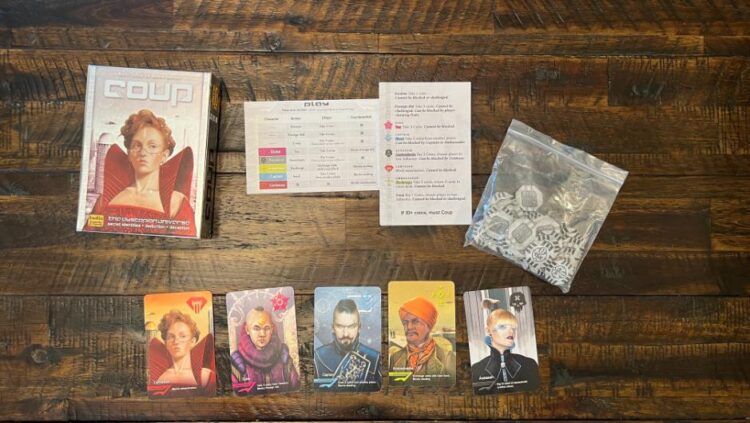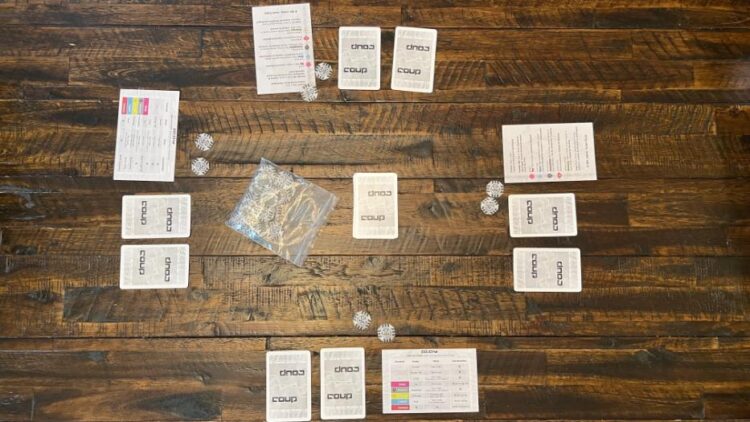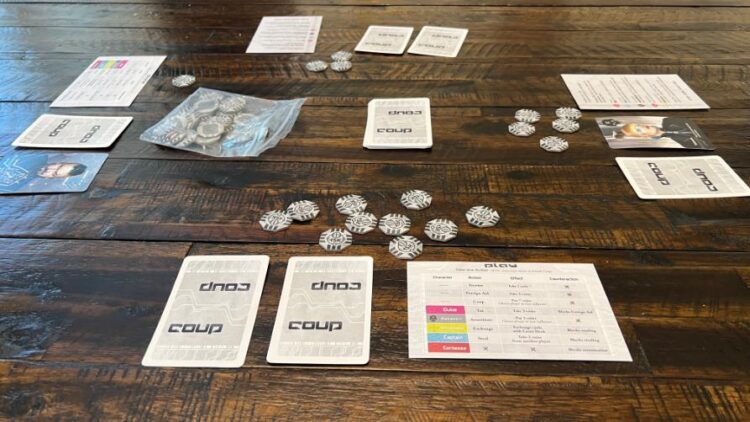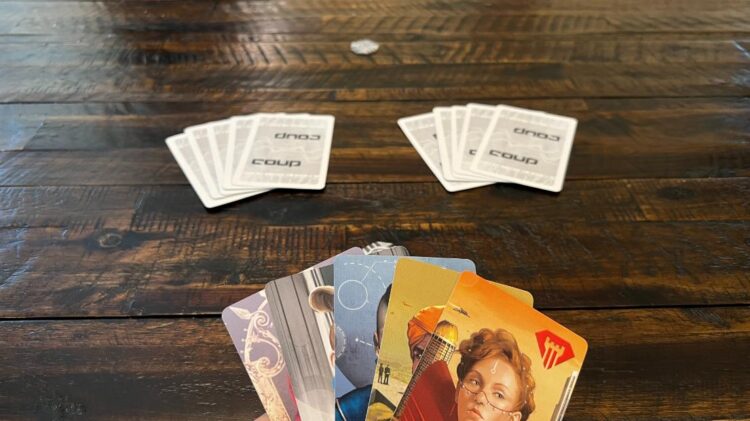
OBJECTIVE OF COUP: Destroy the influence of other players and be the last player standing.
NUMBER OF PLAYERS: 2 to 6 players
MATERIALS OF COUP: 15 character cards (3 of each character: Duke, Captain, Ambassador, Contessa, Assassin), 6 summary cards, and 50 coins
TYPE OF GAME: Board game
AUDIENCE: Teens and adults
OVERVIEW OF COUP

Coup (also called ‘Complots’ in French) is a hidden role-playing game where each player tries to guess the characters of his opponents in order to eliminate them while bluffing to avoid revealing their own characters. If you’re a big fan of deception and bluffing games, you’ll absolutely love this super fun card game!
Coup is a big hoot to play within small groups. While one round may only last around 15 minutes, you could easily play this game for hours on end! I mean, murder, politics, power, and greed… who doesn’t want to play a game where the government is run for profit by a royal class of CEOs?
Want to join in on the fun? We don’t blame you! Here are the rules for the Coup card game.
SETUP FOR COUP

Give each player a summary card. The summary card isn’t used in gameplay, but it is useful to players who are new to the game.
Then, shuffle the 15 character cards, which consist of 3 cards of each character. The characters are:
- Duke
- Assassin
- Captain
- Ambassador
- Contessa
Deal 2 character cards to each player face-down in front of each player. Players may look at their own cards at any time. But be careful not to reveal them to anyone else!
Place all remaining cards face-down in the center. This is the Court deck.
Give all players 2 coins to start. Keep in mind that players must keep their money visible to other players at all times! Put all the remaining coins in the center, constituting the Treasury.
INFLUENCE
Before we jump into the official Coup rules, let’s define what it means to have influence. The two cards in front of each player represent the characters (and their abilities) the player influences in court.
Whenever a player loses an influence, they must turn over and reveal one of their two cards – which card they choose is up to them. When a card is revealed, the player no longer has an influence over this character but will remain face-up in front of the player.
Players lose the game when they lose both their influences!
HOW TO PLAY COUP

Now that you’ve set up the game, it’s time to learn the rules for Coup!
Choose a player to go first. If this is not your first game, the winner of the previous game will be the first to go. Otherwise, the player to the left of the dealer can start. Play then moves clockwise around the table.
When a player takes their turn, they must choose ONE of the following four actions:
- Income: Take 1 coin from the Treasury (this action cannot be countered)
- Foreign Aid: Take 2 coins from the Treasury (this action can be countered by the Duke)
- Coup: Pay 7 coins to the Treasury to launch a coup (this action cannot be countered). If a player has 10 coins, they must launch a coup.
- Use a Character Power: Each character can perform a certain power.
CHARACTER POWER
A character’s power can be divided into character actions and character counteractions. Not all characters have both. Before you perform any kind of character power, you must announce what character’s influence you have before you perform it to prevent any confusion.
CHARACTER ACTIONS
All characters have certain powers you can use with the help of your influence (OR you can bluff pretending that you have influence over these characters, but more on bluffing below!).
Here are the abilities each of the characters have:
- Duke: Take 3 coins from the Treasury (this action cannot be countered)
- Assassin: Pay 3 coins to the Treasury and assassinate a character (this action can be countered by the Contessa)
- Captain: Take 2 coins from another player (this action can be countered by the Ambassador or another Captain)
- Ambassador: Take 2 cards from the Court deck and decide which two of the four cards you now want to keep
CHARACTER COUNTERACTIONS
Here are some counteractions certain characters can use to block or counter another player’s actions.
- Duke: Block Foreign Aid
- Ambassador: Block stealing
- Captain: Block stealing
- Contessa: Block assassination attempts. In this case, any coins paid by the Assassin to the treasury are not returned.
BLUFFING
A huge part of the Coup card game is bluffing. Since other players do not know what two cards each player has, you can easily bluff and pretend to have influence over a character you do not actually have influence over.
So, for example, if you have a Contessa and Ambassador, you could bluff and pretend you have a Duke and claim 3 coins from the Treasury.
Try to be strategic about when and how you bluff. One wrong step, and another player may challenge you!
CHALLENGING
When a player uses a character’s power (action or counteraction), an opponent may question it, whether they are telling the truth or bluffing. In other words, an opponent may question the fact that the player actually owns the character’s card. If more than one player wants to question it, the first person to question it is the challenger.
Anytime a player performs an action or counteraction, other players have an opportunity to challenge the influence.
If a player is challenged, that player must prove that they have the influence.
If they do not have the influence, the player loses and must lose an influence and turn over a character card face-up to show this. Any power effect is also effectively canceled.
If they do have the influence, they must show the character card that proves this. Then, the player must return the card to the Court deck, shuffle, and pick out a new character card so that other players don’t know what this card is.
Since the challenger loses the challenge in this case, the challenger loses an influence. They must choose one of their two character cards to turn over face-up in front of them.
END OF GAME
The goal? Be the last player standing with any influence in the Court. As gameplay continues, players will lose influence and turn over their cards face-up due to assassinations, coups, and challenges.
When there is only one player left with unrevealed character(s) in front of them, that player wins the game!
Looking for other fun deception games to play? Check out our rules for Bullshit and Liar’s Dice!
2 PLAYER VARIATION FOR COUP

The rules for Coup above are best for 3 to 6 players. If you have just one other person to play with, don’t worry; there’s an easy 2-player variation you can play.
Here are the 2-player Coup rules:
- Players start with just 1 coin.
- Separate the cards into 3 piles of each character, so 3 piles of 5 cards.
- Each player takes one pile, chooses one card and discards the other cards.
- Take the third set and deal one card to each player.
- The rest of the cards of the third set (just three cards) make up the Court deck.
- Play as normal, using the Coup rules above.
COUP RULES FOR 7 OR 8 PLAYERS
When playing Coup with more than 6 players, you simply need to get your hand on a Coup set. For 7 to 8 players, you should have 4 cards for each character, instead of 3 in the standard game. For 9 to 10 players, you should have 5 cards for each character.
COUP STRATEGY
Here are some of our top tips and strategies to keep in mind when playing Coup.
DON’T UNDERESTIMATE THE AMBASSADOR
The Ambassador may seem like a weak character card at first glance but don’t underestimate the power of knowledge. Call an Ambassador early on in the game. It’ll not only make you a smaller target since Ambassadors are not very threatening, but it’ll also give you the power to look at 2 other cards in the Court deck. Plus, if you have character cards you are not fond of, you can switch them out for other cards in the deck.
CLAIM THE DUKE
One of the most popular strategies when playing Coup is claiming the Duke. This is a fast way to earn the money you need to launch a coup against another character. Just make sure you don’t get challenged if you don’t actually have a Duke character card!
BE UNTHREATENING
Rather than stealing as the Captain or taking 3 coins from the Treasury as the Duke, another strategy is simply to be as unthreatening as possible for the first half of the game. The best way to do this is to simply take 1 coin from the Treasury as income on your turn. Wait it out until other players have been eliminated to start making moves yourself!
DON’T TAKE FOREIGN AID
Foreign Aid is probably one of the worst actions you can do when playing Coup. If there is a Duke among the group (or if someone is pretending to be the Duke), they will immediately challenge your Foreign Aid, leaving you with no money – unless you challenge and win, of course! It’s better to not take the risk and simply take a single coin as income.
DON’T CHALLENGE AN ASSASSINATION
If you challenge an assassination, there’s a risk of losing both of your influences in one go. How? Well, if an Assassin assassinates one of your influences and you lose the challenge, you lose one influence for the assassination and another influence for losing the challenge!
Of course, if you are correct and win your challenge, the other player will lose an influence instead. But if you are not sure, better to risk losing one of your influences rather than both!
FAQ
How Long Does a Game of Coup Last?
A single game of Coup lasts around 15 minutes, but, generally, you’ll play several games in one sitting!
Is Coup Good for 2 Players?
There is a two-person variation of Coup. While Coup is definitely more entertaining with more people, 2 people can certainly play this game.
Can You Hide Your Coins in Coup?
Absolutely not! You must always have your coins visible in front of all other players throughout the game.
Can You Block for Other Players in Coup?
No, you cannot. Only the target of the action can block it with a counteraction. The only exception is the Duke’s counteraction, which blocks Foreign Aid.
- 25 Top Birthday Party Games for Kids - July 23, 2024
- 40 SUPER FUN GIRLS NIGHT GAMES - July 16, 2024
- 40 Exciting Games to Play When You Are Bored - July 9, 2024